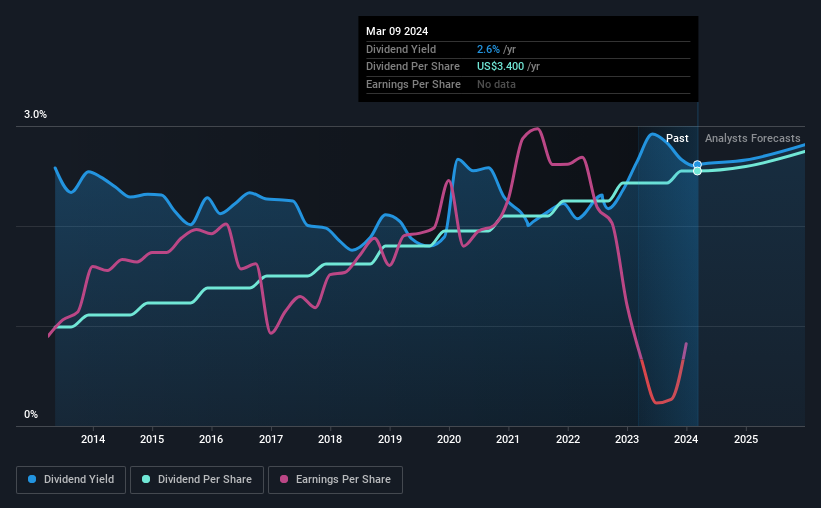Don't Race Out To Buy The Hanover Insurance Group, Inc. (NYSE:THG) Just Because It's Going Ex-Dividend
The Hanover Insurance Group, Inc. (NYSE:THG) is about to trade ex-dividend in the next four days. The ex-dividend date is one business day before the record date, which is the cut-off date for shareholders to be present on the company's books to be eligible for a dividend payment. It is important to be aware of the ex-dividend date because any trade on the stock needs to have been settled on or before the record date. This means that investors who purchase Hanover Insurance Group's shares on or after the 14th of March will not receive the dividend, which will be paid on the 29th of March.
The company's upcoming dividend is US$0.85 a share, following on from the last 12 months, when the company distributed a total of US$3.40 per share to shareholders. Last year's total dividend payments show that Hanover Insurance Group has a trailing yield of 2.6% on the current share price of US$130.11. We love seeing companies pay a dividend, but it's also important to be sure that laying the golden eggs isn't going to kill our golden goose! We need to see whether the dividend is covered by earnings and if it's growing.
Check out our latest analysis for Hanover Insurance Group
If a company pays out more in dividends than it earned, then the dividend might become unsustainable - hardly an ideal situation. Last year, Hanover Insurance Group paid out 350% of its profit to shareholders in the form of dividends. This is not sustainable behaviour and requires a closer look on behalf of the purchaser.
When a company pays out a dividend that is not well covered by profits, the dividend is generally seen as more vulnerable to being cut.
Click here to see the company's payout ratio, plus analyst estimates of its future dividends.
Have Earnings And Dividends Been Growing?
When earnings decline, dividend companies become much harder to analyse and own safely. If business enters a downturn and the dividend is cut, the company could see its value fall precipitously. Hanover Insurance Group's earnings have collapsed faster than Wile E Coyote's schemes to trap the Road Runner; down a tremendous 30% a year over the past five years.
The main way most investors will assess a company's dividend prospects is by checking the historical rate of dividend growth. Since the start of our data, 10 years ago, Hanover Insurance Group has lifted its dividend by approximately 9.9% a year on average. That's intriguing, but the combination of growing dividends despite declining earnings can typically only be achieved by paying out a larger percentage of profits. Hanover Insurance Group is already paying out a high percentage of its income, so without earnings growth, we're doubtful of whether this dividend will grow much in the future.
The Bottom Line
Is Hanover Insurance Group worth buying for its dividend? Earnings per share are in decline and Hanover Insurance Group is paying out what we feel is an uncomfortably high percentage of its profit as dividends. Generally we think dividend investors should avoid businesses in this situation, as high payout ratios and declining earnings can lead to the dividend being cut. Hanover Insurance Group doesn't appear to have a lot going for it, and we're not inclined to take a risk on owning it for the dividend.
With that being said, if you're still considering Hanover Insurance Group as an investment, you'll find it beneficial to know what risks this stock is facing. Our analysis shows 2 warning signs for Hanover Insurance Group and you should be aware of these before buying any shares.
If you're in the market for strong dividend payers, we recommend checking our selection of top dividend stocks.
Have feedback on this article? Concerned about the content? Get in touch with us directly. Alternatively, email editorial-team (at) simplywallst.com.
This article by Simply Wall St is general in nature. We provide commentary based on historical data and analyst forecasts only using an unbiased methodology and our articles are not intended to be financial advice. It does not constitute a recommendation to buy or sell any stock, and does not take account of your objectives, or your financial situation. We aim to bring you long-term focused analysis driven by fundamental data. Note that our analysis may not factor in the latest price-sensitive company announcements or qualitative material. Simply Wall St has no position in any stocks mentioned.

